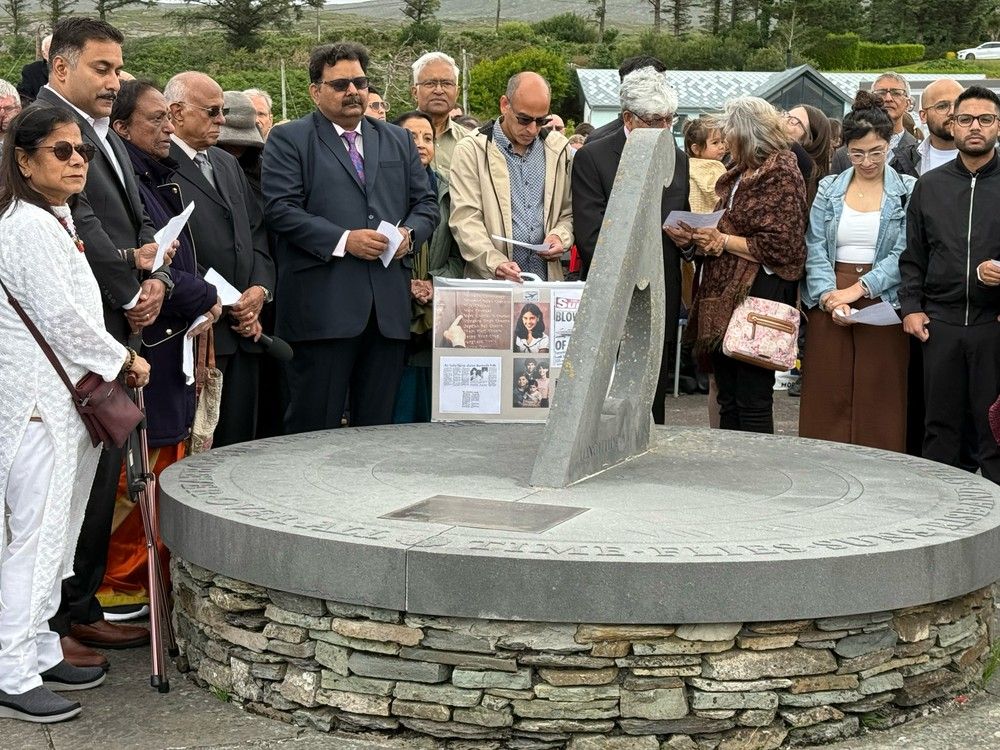
AHAKISTA, Ireland — They came here Monday not only to honour the 331 killed 40 years ago in the Air India bombings, but also to condemn the hatred behind the unprecedented act of terror.
Families of the victims joined politicians from Canada, India and Ireland, as well as first responders and the people of County Cork, who have embraced them and grieved with them over four decades.
Hundreds attended the special anniversary at this scenic spot, surrounded by lush green hills and overlooking the sea near where the plane went down on June 23, 1985.
Irish Prime Minister Micheál Martin said he was honoured to be here “on this the 40th anniversary of that terrible day in 1985 that saw the Air India flight cruelly and horrifically brought down off our coastline.”
“It’s always a privilege and honour to attend this sober commemoration and to witness the dignity, dedication and care with which you remember your loved ones who died so horrifically,” he said. “The passing of time does not dim the scale of loss and of this atrocity. We feel the enormity of your loss when we see the faces and read the stories on the memorial here before us.”
He pointed to some of the simple descriptions of the dead on the memorial wall here: Student. Child.
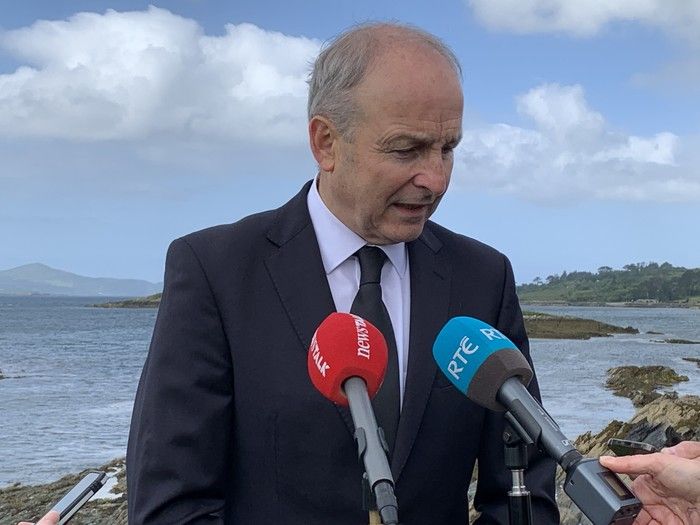
“So many young lives taken far too soon. While the scale of this horrific act is of global significance, we should never forget that it is an intensely personal tragedy.”
A B.C.-made suitcase bomb exploded on the Boeing 747, en route from Toronto to India, just after 8 a.m. and less than an hour after another B.C. bomb blew up at Japan’s Narita Airport, killing two baggage handlers.
At exactly 8:12 a.m. Monday, the families stood around a sun dial monument for a minute of silence, before breaking out with soulful chants. Schoolchildren played tin whistles and sang Let It Be.
Pradeep Kalsi recalled waiting at an airport in India for his sister Indira, 21, to arrive from Ontario, where she was a student at the University of Guelph.
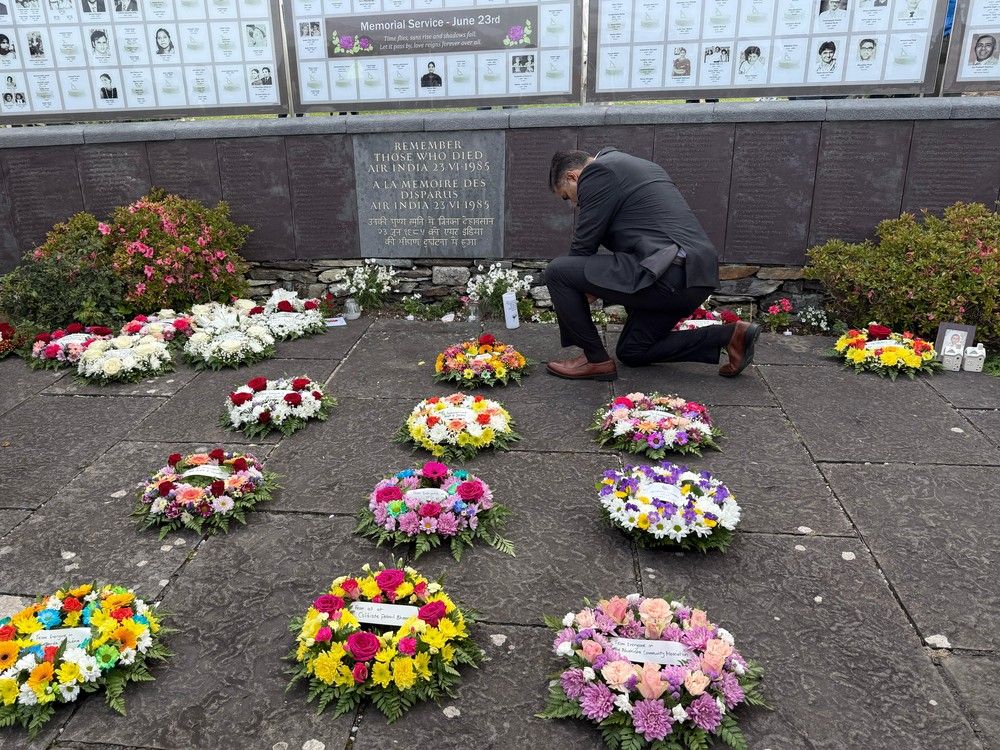
“We got the horrific news as we were waiting for her, there was some brief mention of the horrific details of that particular flight,” he told those gathered.
But like all the families of those killed, Kalsi also spoke of “the kindness, the gentleness of the Irish people.”
“It’s just astounding, and it keeps us coming back year after year.”
While the focus here was on those who perished, there was also widespread condemnation of the B.C. terrorists, linked to the Babbar Khalsa Sikh separatist group, behind the mass murder. Only one man, Inderjit Singh Reyat, was convicted of manslaughter in connection with the bombing. Two others were acquitted in B.C. Supreme Court in 2005. The mastermind, Talwinder Singh Parmar, was killed by Indian police before he could be charged.
Canadian Public Safety Minister Gary Anandasangaree told the families that they “carry the burden of history and the failures of our systems to protect your loved ones.”
“Justice was never served, notwithstanding your deep desire and constant search and yearning for it,” he said.
He recalled being just 13 and a new immigrant with a part-time job at a grocery store in Toronto’s Little India when he learned about “this horrific incident.”
As he arrived that day at his job on Gerrard Street, he “saw the shock and disbelief on people’s faces.”
“While we grieve with you today, this anniversary is a reminder to governments around the world that we must condemn terrorism and fight it at every turn. Canada will do its part,” Anandasangaree said.
Indian cabinet minister Hardeep Singh Puri lamented the loss of more than 80 children on Air India Flight 182.
“This tragedy was not an accident. It was a deliberate, heinous attack carried out by extremist elements associated with fringe and radical movements who sought to weaken and still seek to weaken countries by such actions through terror,” Puri said. “Sadly, this is not merely an episode of the past. Terrorism and extremism remain a very real present day threat, one that many of our countries know very well.”
He also called on “the global community to remember our shared responsibility.”
“I call upon our Canadian friends, in particular, to deepen our bilateral collaboration,” Puri said.
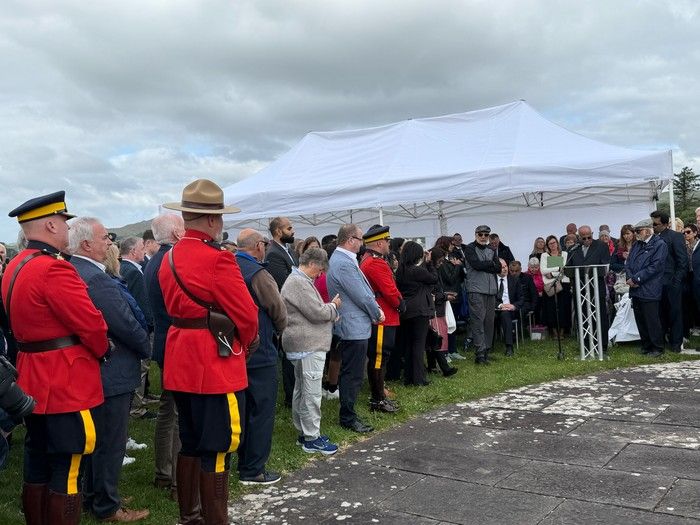
After the politicians were done, Toronto’s Padmini Turlapati, now 84, spoke of her two dead sons — Sanjay, 14, and Deepak, 11.
Sanjay’s name means “foresight and wisdom” and he was both, she said. Always helping his mother and others. Deepak was “a happy-go-lucky, mischievous fellow, and I was always scolding him for not keeping his room tidy,” she said.
“On the day of his travel, he told me, ‘Mom, I made my bed,’ and later on, when I went to his room, I found his bed was neatly done, but all his things were strewn under, dumped under his bed.”
After the speeches, there were many hugs and smiles with family members snapping pictures of the memorial wall and of several Mounties from Vancouver dressed in red serge. And there was a tent full of coffee, tea, pies and cakes and warm conversation.
Indira Kalsi’s siblings and cousins walked down a few stairs to the rocky beach and threw yellow flowers into the water to honour her.
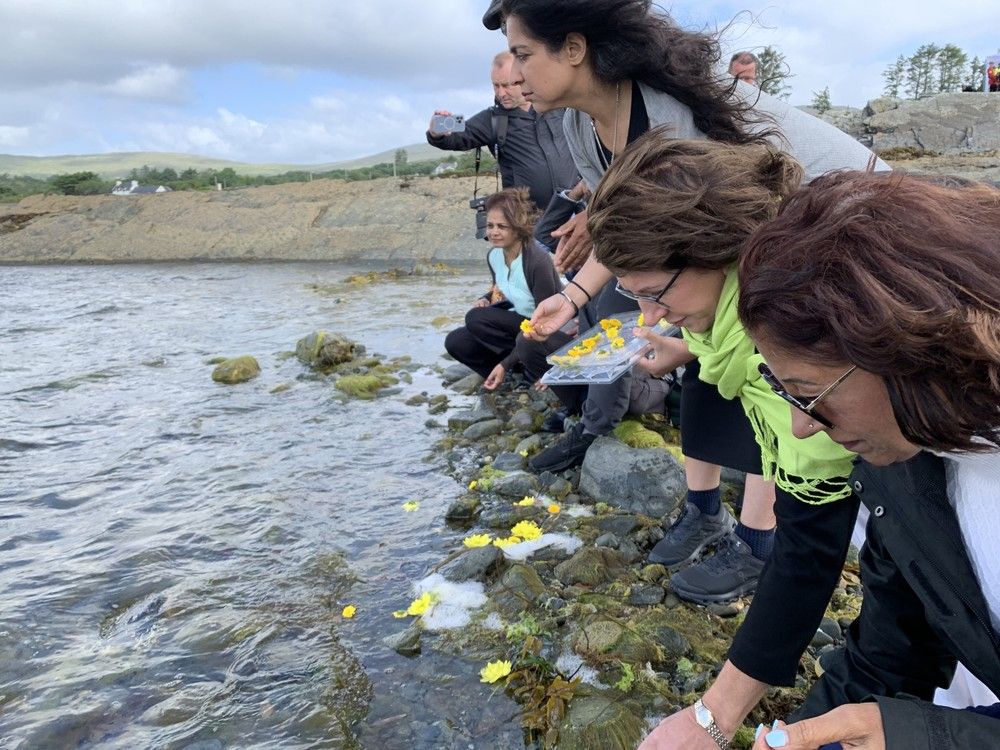
Toronto’s Lata Pada, who lost husband Vishnu and daughters, Arti and Brinda, said this spot is a sacred place for her.
“It is a pilgrimage, but this year is particularly meaningful moving because of the magnitude of people who have been involved in the ceremony, and to see so many people gathered here to offer their solidarity and support,” she said. “All of us just don’t want this event to be erased from history, and we hope we can do whatever we can to make sure it remains within the public consciousness.”
Bluesky: @kimbolan.bsky.social